Corporate Governance, CSR, and Financial Reporting in ASX Companies
VerifiedAdded on 2021/05/11
|10
|2065
|26
Report
AI Summary
This report provides a comprehensive analysis of corporate governance principles and their application within ASX-listed companies. It examines key principles, including establishing solid management foundations and instilling a culture of ethical and responsible behavior. The report explores the direct link between these principles and improved business performance, emphasizing the importance of skilled personnel, ethical conduct, and stakeholder confidence. It also delves into the positive accounting theory and its connection to corporate governance, discussing how managers use accounting announcements to align with their interests and organizational growth. Furthermore, the report highlights the positive impact of corporate responsibility reporting on business performance and financial results, citing research on sustainability reporting and its influence on profitability and share price. It also identifies challenges faced by organizations in preparing corporate responsibility reports, such as measuring non-financial aspects, gaining stakeholder support, and ensuring transparency. The report concludes by emphasizing the importance of adopting CSR principles and governance practices to strengthen transparency and improve overall performance.
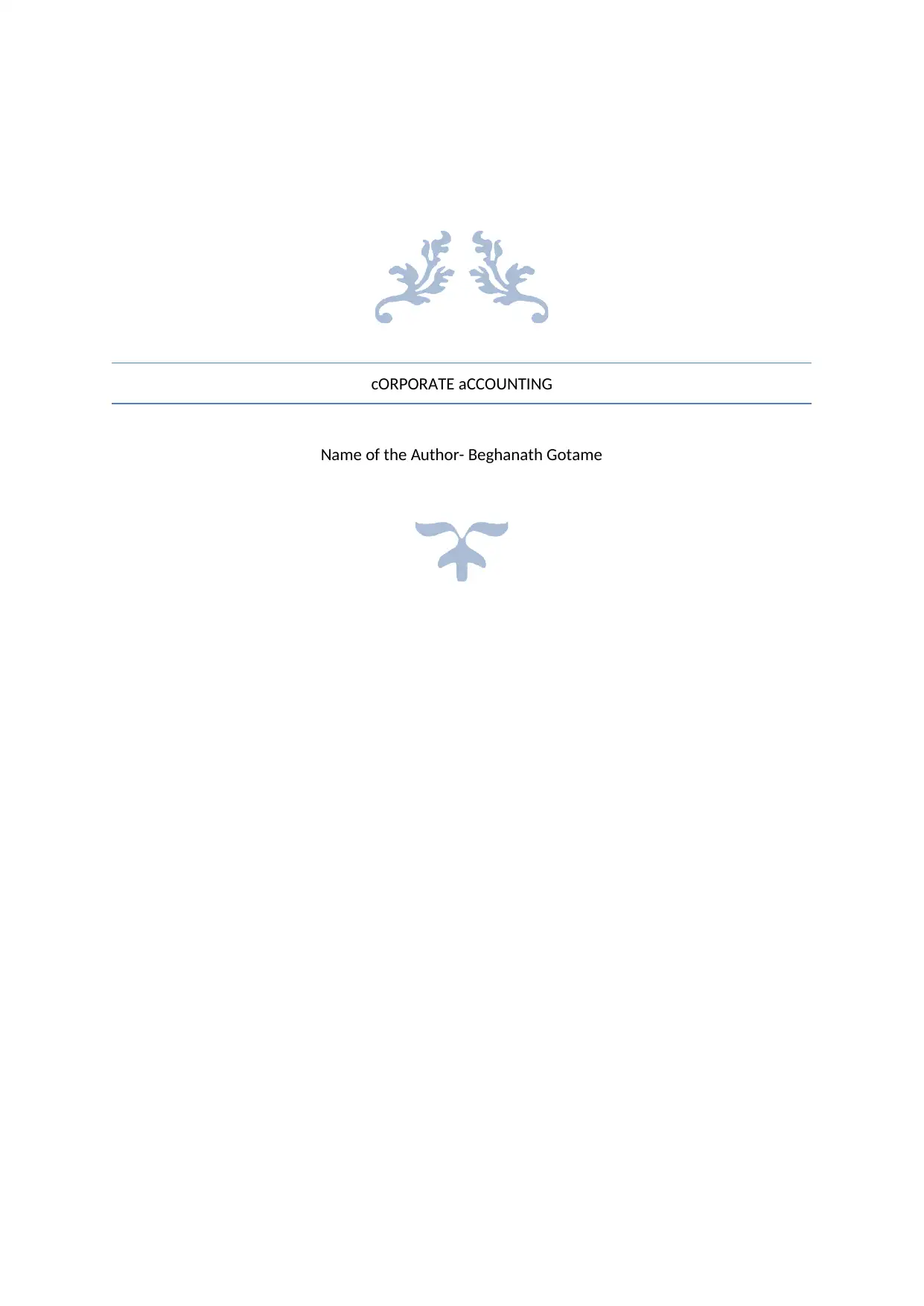
cORPORATE aCCOUNTING
Name of the Author- Beghanath Gotame
Name of the Author- Beghanath Gotame
Paraphrase This Document
Need a fresh take? Get an instant paraphrase of this document with our AI Paraphraser

Table of Contents
Introduction...........................................................................................................................................2
ISSUE 1.................................................................................................................................................2
ISSUE 2.................................................................................................................................................3
ISSUE 3.................................................................................................................................................3
ISSUE 4.................................................................................................................................................4
ISSUE 5.................................................................................................................................................6
Conclusion.............................................................................................................................................7
References.............................................................................................................................................8
1
Introduction...........................................................................................................................................2
ISSUE 1.................................................................................................................................................2
ISSUE 2.................................................................................................................................................3
ISSUE 3.................................................................................................................................................3
ISSUE 4.................................................................................................................................................4
ISSUE 5.................................................................................................................................................6
Conclusion.............................................................................................................................................7
References.............................................................................................................................................8
1
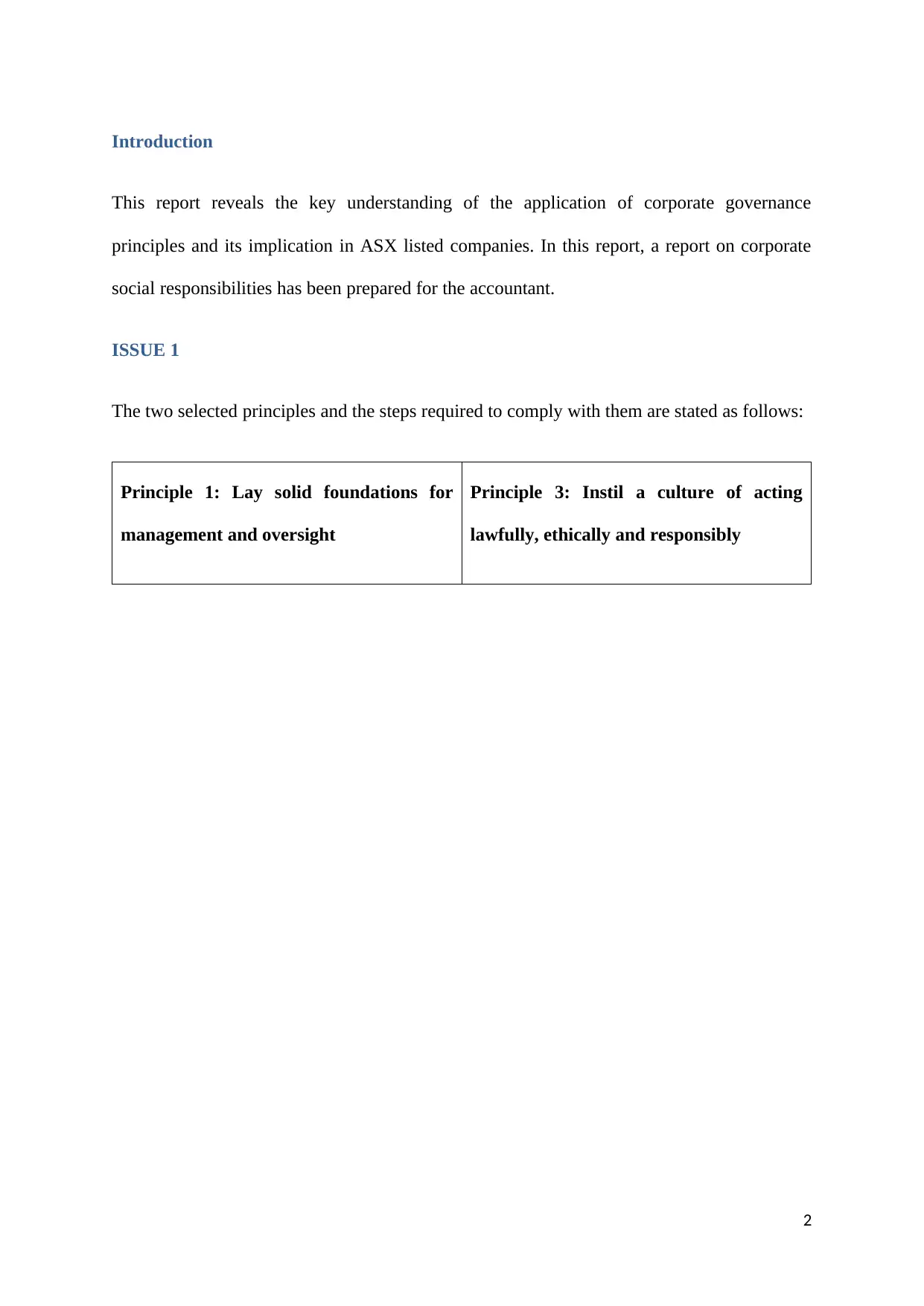
Introduction
This report reveals the key understanding of the application of corporate governance
principles and its implication in ASX listed companies. In this report, a report on corporate
social responsibilities has been prepared for the accountant.
ISSUE 1
The two selected principles and the steps required to comply with them are stated as follows:
Principle 1: Lay solid foundations for
management and oversight
Principle 3: Instil a culture of acting
lawfully, ethically and responsibly
2
This report reveals the key understanding of the application of corporate governance
principles and its implication in ASX listed companies. In this report, a report on corporate
social responsibilities has been prepared for the accountant.
ISSUE 1
The two selected principles and the steps required to comply with them are stated as follows:
Principle 1: Lay solid foundations for
management and oversight
Principle 3: Instil a culture of acting
lawfully, ethically and responsibly
2
⊘ This is a preview!⊘
Do you want full access?
Subscribe today to unlock all pages.

Trusted by 1+ million students worldwide
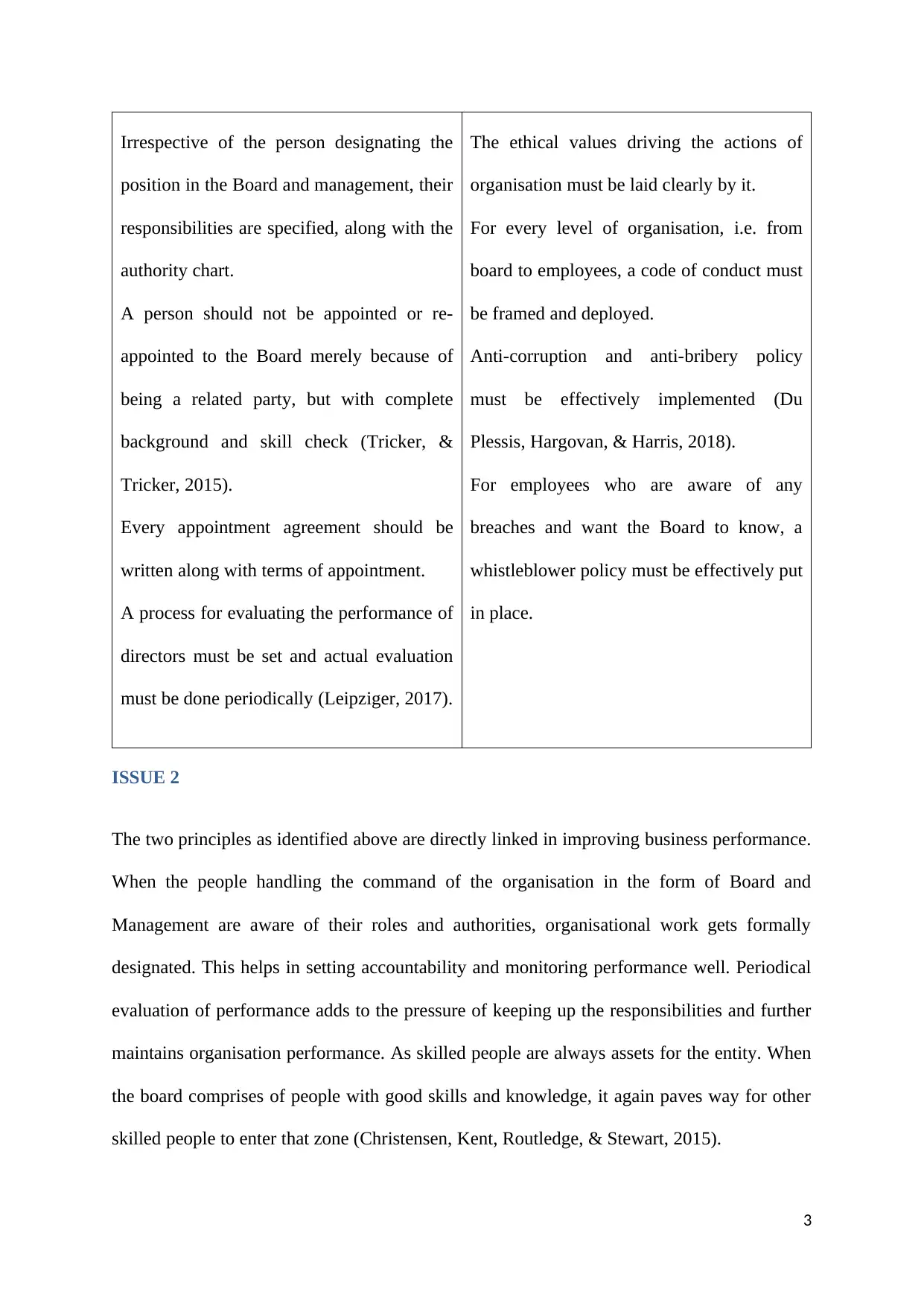
Irrespective of the person designating the
position in the Board and management, their
responsibilities are specified, along with the
authority chart.
A person should not be appointed or re-
appointed to the Board merely because of
being a related party, but with complete
background and skill check (Tricker, &
Tricker, 2015).
Every appointment agreement should be
written along with terms of appointment.
A process for evaluating the performance of
directors must be set and actual evaluation
must be done periodically (Leipziger, 2017).
The ethical values driving the actions of
organisation must be laid clearly by it.
For every level of organisation, i.e. from
board to employees, a code of conduct must
be framed and deployed.
Anti-corruption and anti-bribery policy
must be effectively implemented (Du
Plessis, Hargovan, & Harris, 2018).
For employees who are aware of any
breaches and want the Board to know, a
whistleblower policy must be effectively put
in place.
ISSUE 2
The two principles as identified above are directly linked in improving business performance.
When the people handling the command of the organisation in the form of Board and
Management are aware of their roles and authorities, organisational work gets formally
designated. This helps in setting accountability and monitoring performance well. Periodical
evaluation of performance adds to the pressure of keeping up the responsibilities and further
maintains organisation performance. As skilled people are always assets for the entity. When
the board comprises of people with good skills and knowledge, it again paves way for other
skilled people to enter that zone (Christensen, Kent, Routledge, & Stewart, 2015).
3
position in the Board and management, their
responsibilities are specified, along with the
authority chart.
A person should not be appointed or re-
appointed to the Board merely because of
being a related party, but with complete
background and skill check (Tricker, &
Tricker, 2015).
Every appointment agreement should be
written along with terms of appointment.
A process for evaluating the performance of
directors must be set and actual evaluation
must be done periodically (Leipziger, 2017).
The ethical values driving the actions of
organisation must be laid clearly by it.
For every level of organisation, i.e. from
board to employees, a code of conduct must
be framed and deployed.
Anti-corruption and anti-bribery policy
must be effectively implemented (Du
Plessis, Hargovan, & Harris, 2018).
For employees who are aware of any
breaches and want the Board to know, a
whistleblower policy must be effectively put
in place.
ISSUE 2
The two principles as identified above are directly linked in improving business performance.
When the people handling the command of the organisation in the form of Board and
Management are aware of their roles and authorities, organisational work gets formally
designated. This helps in setting accountability and monitoring performance well. Periodical
evaluation of performance adds to the pressure of keeping up the responsibilities and further
maintains organisation performance. As skilled people are always assets for the entity. When
the board comprises of people with good skills and knowledge, it again paves way for other
skilled people to enter that zone (Christensen, Kent, Routledge, & Stewart, 2015).
3
Paraphrase This Document
Need a fresh take? Get an instant paraphrase of this document with our AI Paraphraser
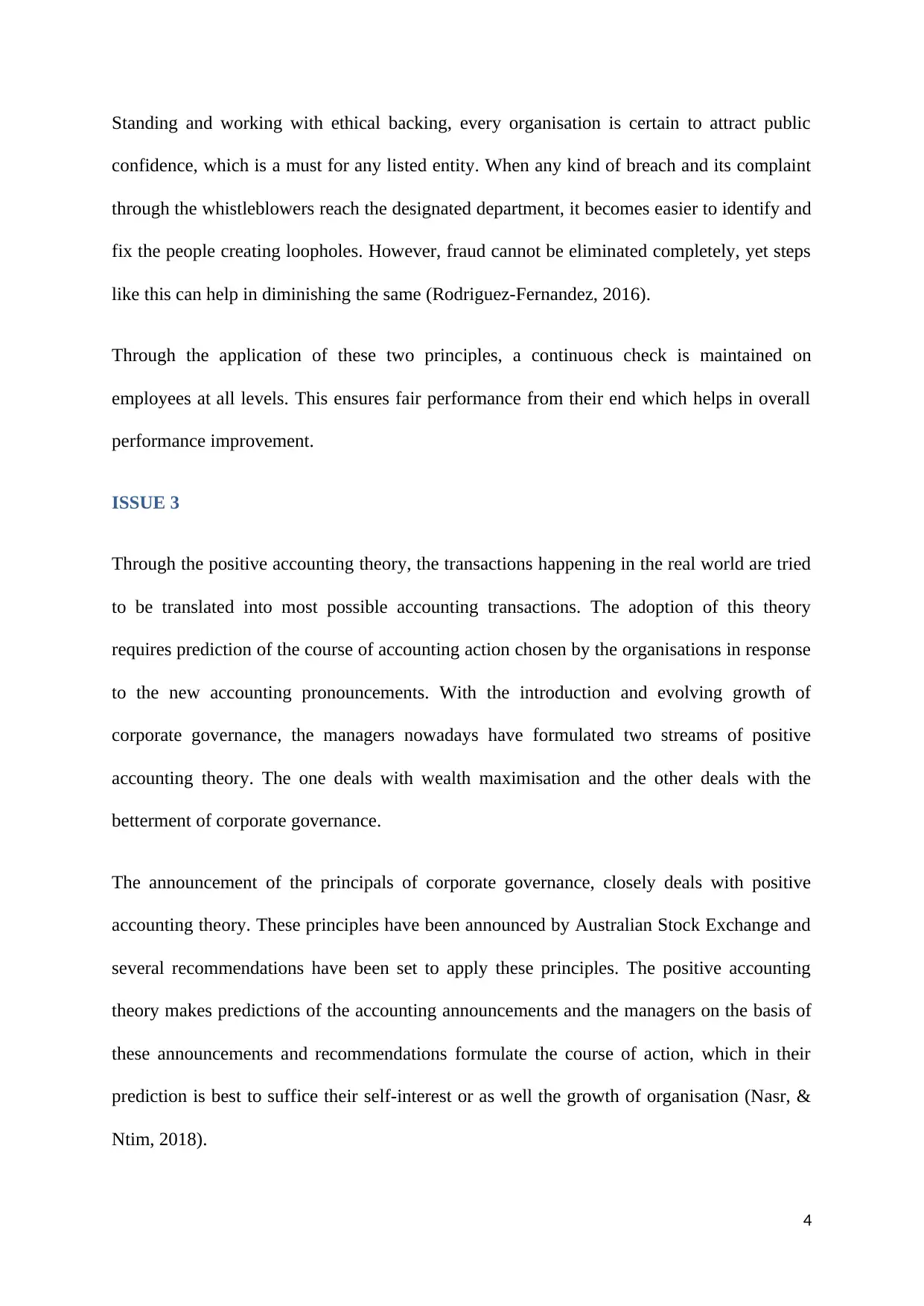
Standing and working with ethical backing, every organisation is certain to attract public
confidence, which is a must for any listed entity. When any kind of breach and its complaint
through the whistleblowers reach the designated department, it becomes easier to identify and
fix the people creating loopholes. However, fraud cannot be eliminated completely, yet steps
like this can help in diminishing the same (Rodriguez-Fernandez, 2016).
Through the application of these two principles, a continuous check is maintained on
employees at all levels. This ensures fair performance from their end which helps in overall
performance improvement.
ISSUE 3
Through the positive accounting theory, the transactions happening in the real world are tried
to be translated into most possible accounting transactions. The adoption of this theory
requires prediction of the course of accounting action chosen by the organisations in response
to the new accounting pronouncements. With the introduction and evolving growth of
corporate governance, the managers nowadays have formulated two streams of positive
accounting theory. The one deals with wealth maximisation and the other deals with the
betterment of corporate governance.
The announcement of the principals of corporate governance, closely deals with positive
accounting theory. These principles have been announced by Australian Stock Exchange and
several recommendations have been set to apply these principles. The positive accounting
theory makes predictions of the accounting announcements and the managers on the basis of
these announcements and recommendations formulate the course of action, which in their
prediction is best to suffice their self-interest or as well the growth of organisation (Nasr, &
Ntim, 2018).
4
confidence, which is a must for any listed entity. When any kind of breach and its complaint
through the whistleblowers reach the designated department, it becomes easier to identify and
fix the people creating loopholes. However, fraud cannot be eliminated completely, yet steps
like this can help in diminishing the same (Rodriguez-Fernandez, 2016).
Through the application of these two principles, a continuous check is maintained on
employees at all levels. This ensures fair performance from their end which helps in overall
performance improvement.
ISSUE 3
Through the positive accounting theory, the transactions happening in the real world are tried
to be translated into most possible accounting transactions. The adoption of this theory
requires prediction of the course of accounting action chosen by the organisations in response
to the new accounting pronouncements. With the introduction and evolving growth of
corporate governance, the managers nowadays have formulated two streams of positive
accounting theory. The one deals with wealth maximisation and the other deals with the
betterment of corporate governance.
The announcement of the principals of corporate governance, closely deals with positive
accounting theory. These principles have been announced by Australian Stock Exchange and
several recommendations have been set to apply these principles. The positive accounting
theory makes predictions of the accounting announcements and the managers on the basis of
these announcements and recommendations formulate the course of action, which in their
prediction is best to suffice their self-interest or as well the growth of organisation (Nasr, &
Ntim, 2018).
4
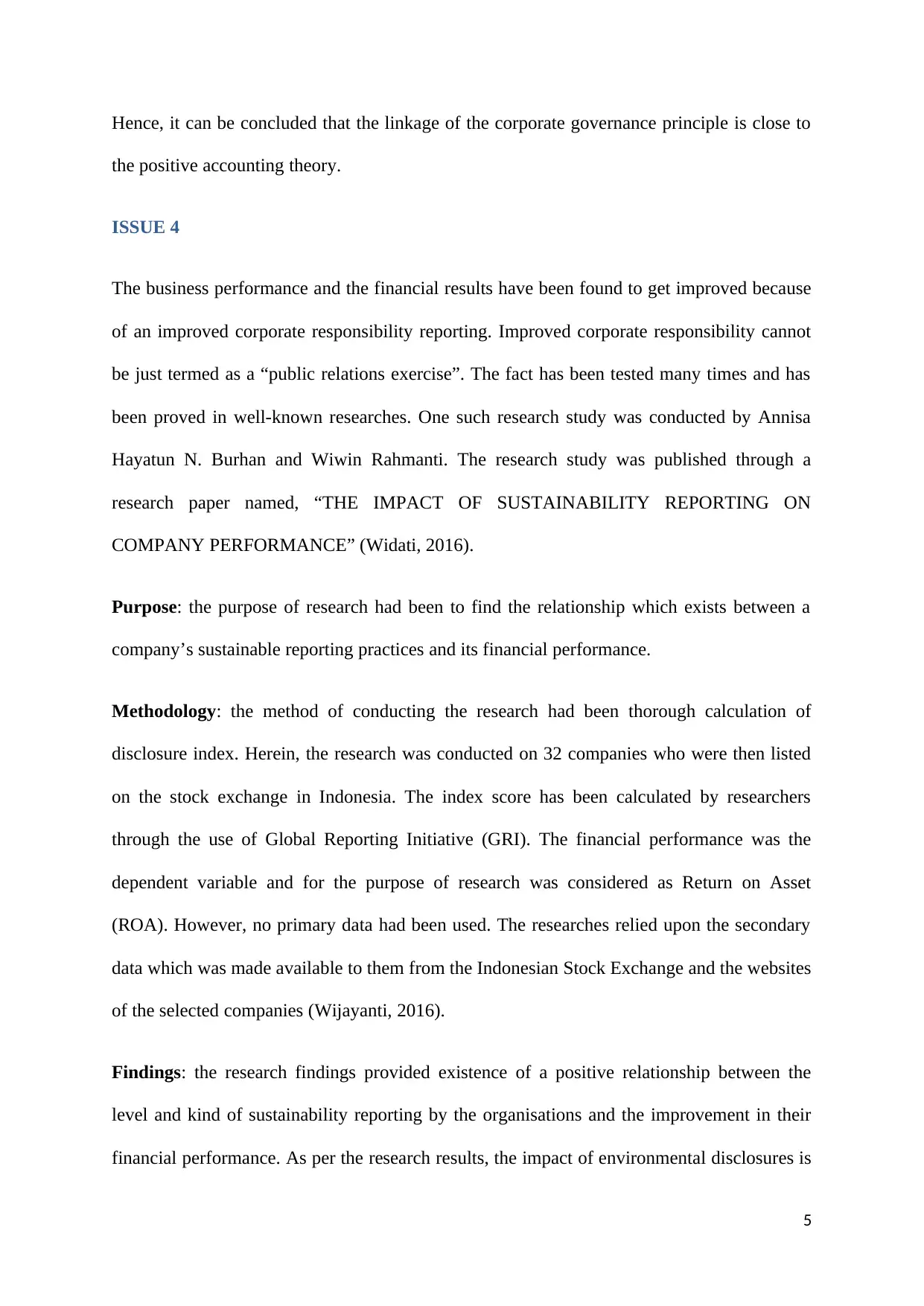
Hence, it can be concluded that the linkage of the corporate governance principle is close to
the positive accounting theory.
ISSUE 4
The business performance and the financial results have been found to get improved because
of an improved corporate responsibility reporting. Improved corporate responsibility cannot
be just termed as a “public relations exercise”. The fact has been tested many times and has
been proved in well-known researches. One such research study was conducted by Annisa
Hayatun N. Burhan and Wiwin Rahmanti. The research study was published through a
research paper named, “THE IMPACT OF SUSTAINABILITY REPORTING ON
COMPANY PERFORMANCE” (Widati, 2016).
Purpose: the purpose of research had been to find the relationship which exists between a
company’s sustainable reporting practices and its financial performance.
Methodology: the method of conducting the research had been thorough calculation of
disclosure index. Herein, the research was conducted on 32 companies who were then listed
on the stock exchange in Indonesia. The index score has been calculated by researchers
through the use of Global Reporting Initiative (GRI). The financial performance was the
dependent variable and for the purpose of research was considered as Return on Asset
(ROA). However, no primary data had been used. The researches relied upon the secondary
data which was made available to them from the Indonesian Stock Exchange and the websites
of the selected companies (Wijayanti, 2016).
Findings: the research findings provided existence of a positive relationship between the
level and kind of sustainability reporting by the organisations and the improvement in their
financial performance. As per the research results, the impact of environmental disclosures is
5
the positive accounting theory.
ISSUE 4
The business performance and the financial results have been found to get improved because
of an improved corporate responsibility reporting. Improved corporate responsibility cannot
be just termed as a “public relations exercise”. The fact has been tested many times and has
been proved in well-known researches. One such research study was conducted by Annisa
Hayatun N. Burhan and Wiwin Rahmanti. The research study was published through a
research paper named, “THE IMPACT OF SUSTAINABILITY REPORTING ON
COMPANY PERFORMANCE” (Widati, 2016).
Purpose: the purpose of research had been to find the relationship which exists between a
company’s sustainable reporting practices and its financial performance.
Methodology: the method of conducting the research had been thorough calculation of
disclosure index. Herein, the research was conducted on 32 companies who were then listed
on the stock exchange in Indonesia. The index score has been calculated by researchers
through the use of Global Reporting Initiative (GRI). The financial performance was the
dependent variable and for the purpose of research was considered as Return on Asset
(ROA). However, no primary data had been used. The researches relied upon the secondary
data which was made available to them from the Indonesian Stock Exchange and the websites
of the selected companies (Wijayanti, 2016).
Findings: the research findings provided existence of a positive relationship between the
level and kind of sustainability reporting by the organisations and the improvement in their
financial performance. As per the research results, the impact of environmental disclosures is
5
⊘ This is a preview!⊘
Do you want full access?
Subscribe today to unlock all pages.

Trusted by 1+ million students worldwide
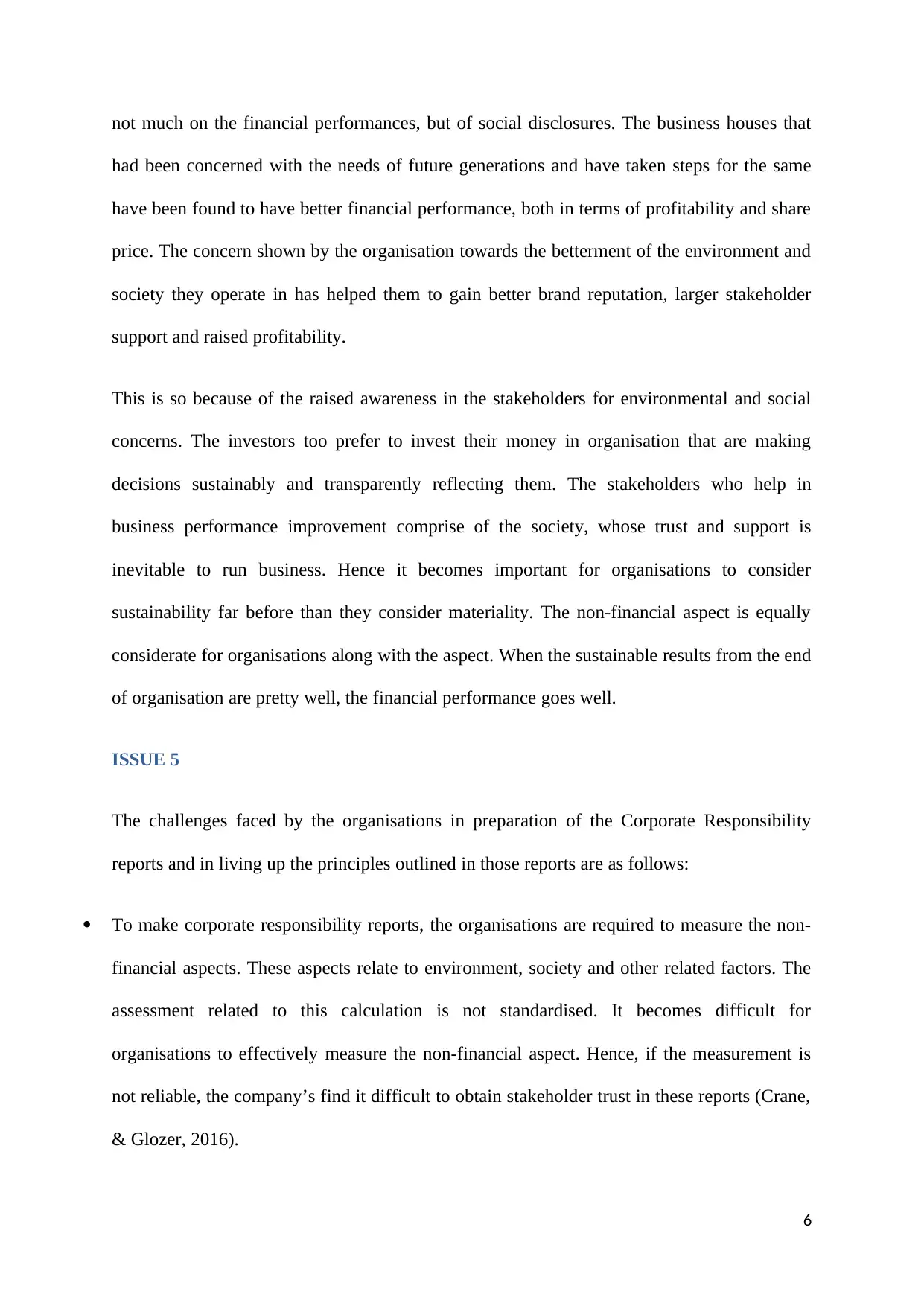
not much on the financial performances, but of social disclosures. The business houses that
had been concerned with the needs of future generations and have taken steps for the same
have been found to have better financial performance, both in terms of profitability and share
price. The concern shown by the organisation towards the betterment of the environment and
society they operate in has helped them to gain better brand reputation, larger stakeholder
support and raised profitability.
This is so because of the raised awareness in the stakeholders for environmental and social
concerns. The investors too prefer to invest their money in organisation that are making
decisions sustainably and transparently reflecting them. The stakeholders who help in
business performance improvement comprise of the society, whose trust and support is
inevitable to run business. Hence it becomes important for organisations to consider
sustainability far before than they consider materiality. The non-financial aspect is equally
considerate for organisations along with the aspect. When the sustainable results from the end
of organisation are pretty well, the financial performance goes well.
ISSUE 5
The challenges faced by the organisations in preparation of the Corporate Responsibility
reports and in living up the principles outlined in those reports are as follows:
To make corporate responsibility reports, the organisations are required to measure the non-
financial aspects. These aspects relate to environment, society and other related factors. The
assessment related to this calculation is not standardised. It becomes difficult for
organisations to effectively measure the non-financial aspect. Hence, if the measurement is
not reliable, the company’s find it difficult to obtain stakeholder trust in these reports (Crane,
& Glozer, 2016).
6
had been concerned with the needs of future generations and have taken steps for the same
have been found to have better financial performance, both in terms of profitability and share
price. The concern shown by the organisation towards the betterment of the environment and
society they operate in has helped them to gain better brand reputation, larger stakeholder
support and raised profitability.
This is so because of the raised awareness in the stakeholders for environmental and social
concerns. The investors too prefer to invest their money in organisation that are making
decisions sustainably and transparently reflecting them. The stakeholders who help in
business performance improvement comprise of the society, whose trust and support is
inevitable to run business. Hence it becomes important for organisations to consider
sustainability far before than they consider materiality. The non-financial aspect is equally
considerate for organisations along with the aspect. When the sustainable results from the end
of organisation are pretty well, the financial performance goes well.
ISSUE 5
The challenges faced by the organisations in preparation of the Corporate Responsibility
reports and in living up the principles outlined in those reports are as follows:
To make corporate responsibility reports, the organisations are required to measure the non-
financial aspects. These aspects relate to environment, society and other related factors. The
assessment related to this calculation is not standardised. It becomes difficult for
organisations to effectively measure the non-financial aspect. Hence, if the measurement is
not reliable, the company’s find it difficult to obtain stakeholder trust in these reports (Crane,
& Glozer, 2016).
6
Paraphrase This Document
Need a fresh take? Get an instant paraphrase of this document with our AI Paraphraser
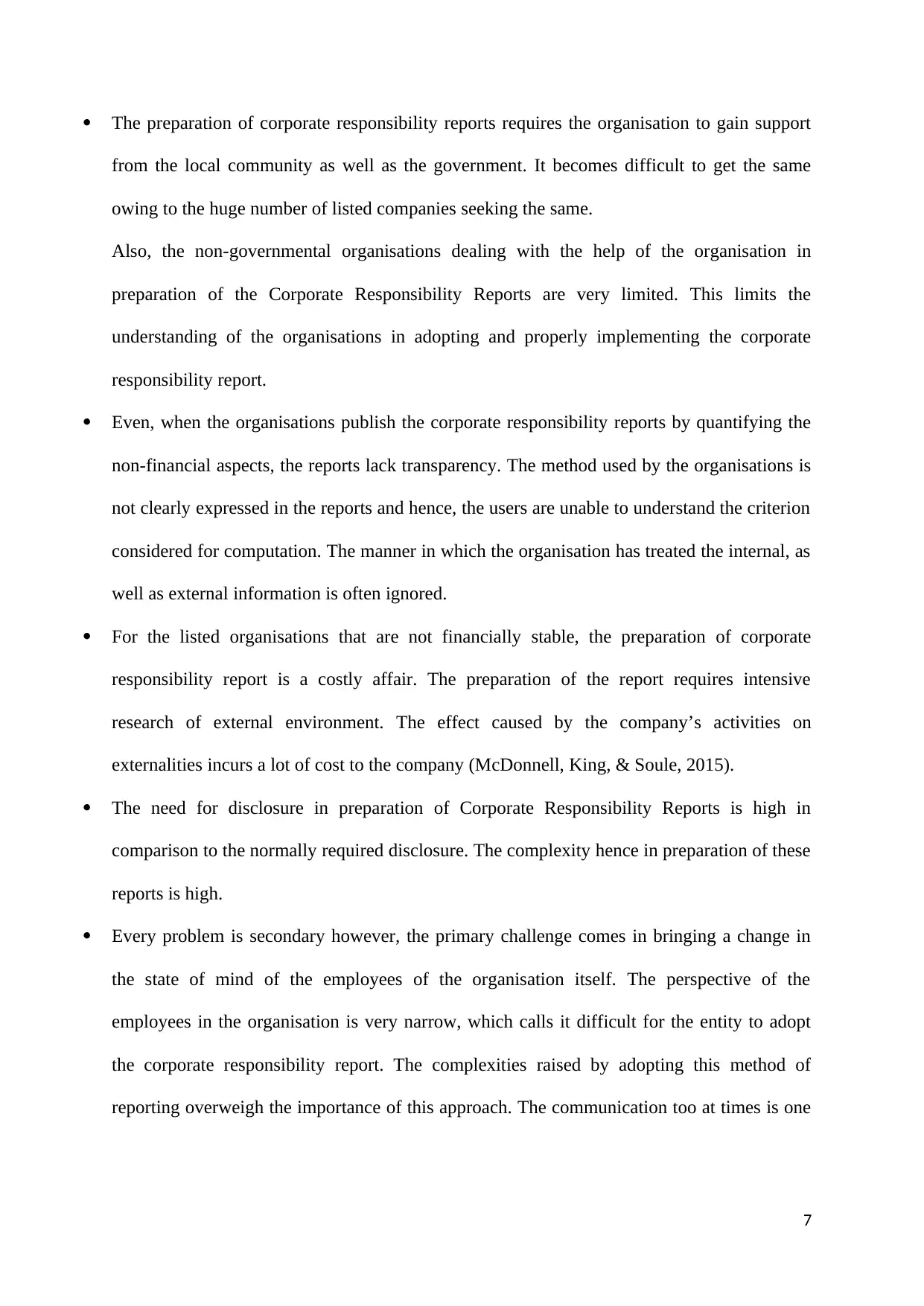
The preparation of corporate responsibility reports requires the organisation to gain support
from the local community as well as the government. It becomes difficult to get the same
owing to the huge number of listed companies seeking the same.
Also, the non-governmental organisations dealing with the help of the organisation in
preparation of the Corporate Responsibility Reports are very limited. This limits the
understanding of the organisations in adopting and properly implementing the corporate
responsibility report.
Even, when the organisations publish the corporate responsibility reports by quantifying the
non-financial aspects, the reports lack transparency. The method used by the organisations is
not clearly expressed in the reports and hence, the users are unable to understand the criterion
considered for computation. The manner in which the organisation has treated the internal, as
well as external information is often ignored.
For the listed organisations that are not financially stable, the preparation of corporate
responsibility report is a costly affair. The preparation of the report requires intensive
research of external environment. The effect caused by the company’s activities on
externalities incurs a lot of cost to the company (McDonnell, King, & Soule, 2015).
The need for disclosure in preparation of Corporate Responsibility Reports is high in
comparison to the normally required disclosure. The complexity hence in preparation of these
reports is high.
Every problem is secondary however, the primary challenge comes in bringing a change in
the state of mind of the employees of the organisation itself. The perspective of the
employees in the organisation is very narrow, which calls it difficult for the entity to adopt
the corporate responsibility report. The complexities raised by adopting this method of
reporting overweigh the importance of this approach. The communication too at times is one
7
from the local community as well as the government. It becomes difficult to get the same
owing to the huge number of listed companies seeking the same.
Also, the non-governmental organisations dealing with the help of the organisation in
preparation of the Corporate Responsibility Reports are very limited. This limits the
understanding of the organisations in adopting and properly implementing the corporate
responsibility report.
Even, when the organisations publish the corporate responsibility reports by quantifying the
non-financial aspects, the reports lack transparency. The method used by the organisations is
not clearly expressed in the reports and hence, the users are unable to understand the criterion
considered for computation. The manner in which the organisation has treated the internal, as
well as external information is often ignored.
For the listed organisations that are not financially stable, the preparation of corporate
responsibility report is a costly affair. The preparation of the report requires intensive
research of external environment. The effect caused by the company’s activities on
externalities incurs a lot of cost to the company (McDonnell, King, & Soule, 2015).
The need for disclosure in preparation of Corporate Responsibility Reports is high in
comparison to the normally required disclosure. The complexity hence in preparation of these
reports is high.
Every problem is secondary however, the primary challenge comes in bringing a change in
the state of mind of the employees of the organisation itself. The perspective of the
employees in the organisation is very narrow, which calls it difficult for the entity to adopt
the corporate responsibility report. The complexities raised by adopting this method of
reporting overweigh the importance of this approach. The communication too at times is one
7
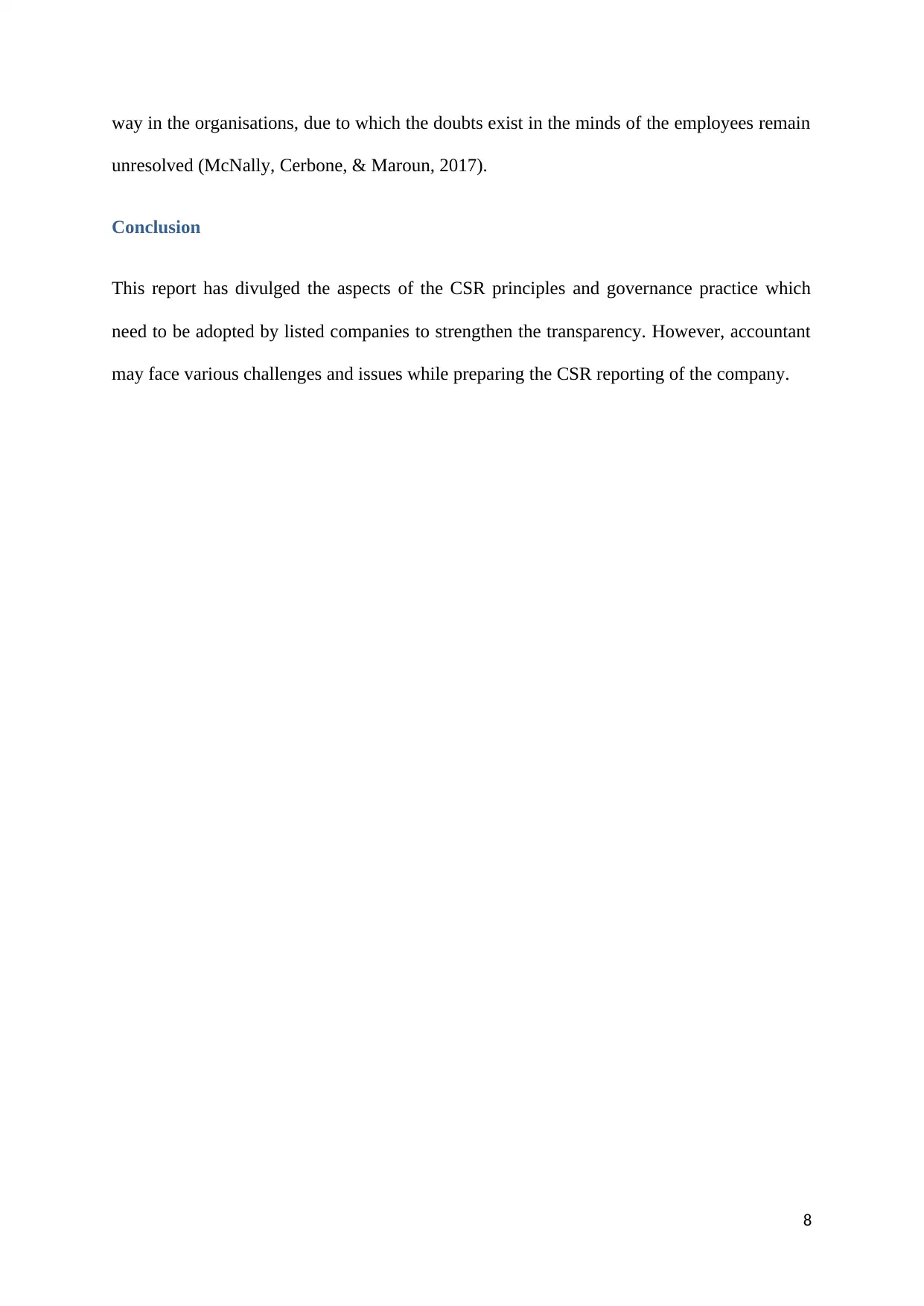
way in the organisations, due to which the doubts exist in the minds of the employees remain
unresolved (McNally, Cerbone, & Maroun, 2017).
Conclusion
This report has divulged the aspects of the CSR principles and governance practice which
need to be adopted by listed companies to strengthen the transparency. However, accountant
may face various challenges and issues while preparing the CSR reporting of the company.
8
unresolved (McNally, Cerbone, & Maroun, 2017).
Conclusion
This report has divulged the aspects of the CSR principles and governance practice which
need to be adopted by listed companies to strengthen the transparency. However, accountant
may face various challenges and issues while preparing the CSR reporting of the company.
8
⊘ This is a preview!⊘
Do you want full access?
Subscribe today to unlock all pages.

Trusted by 1+ million students worldwide
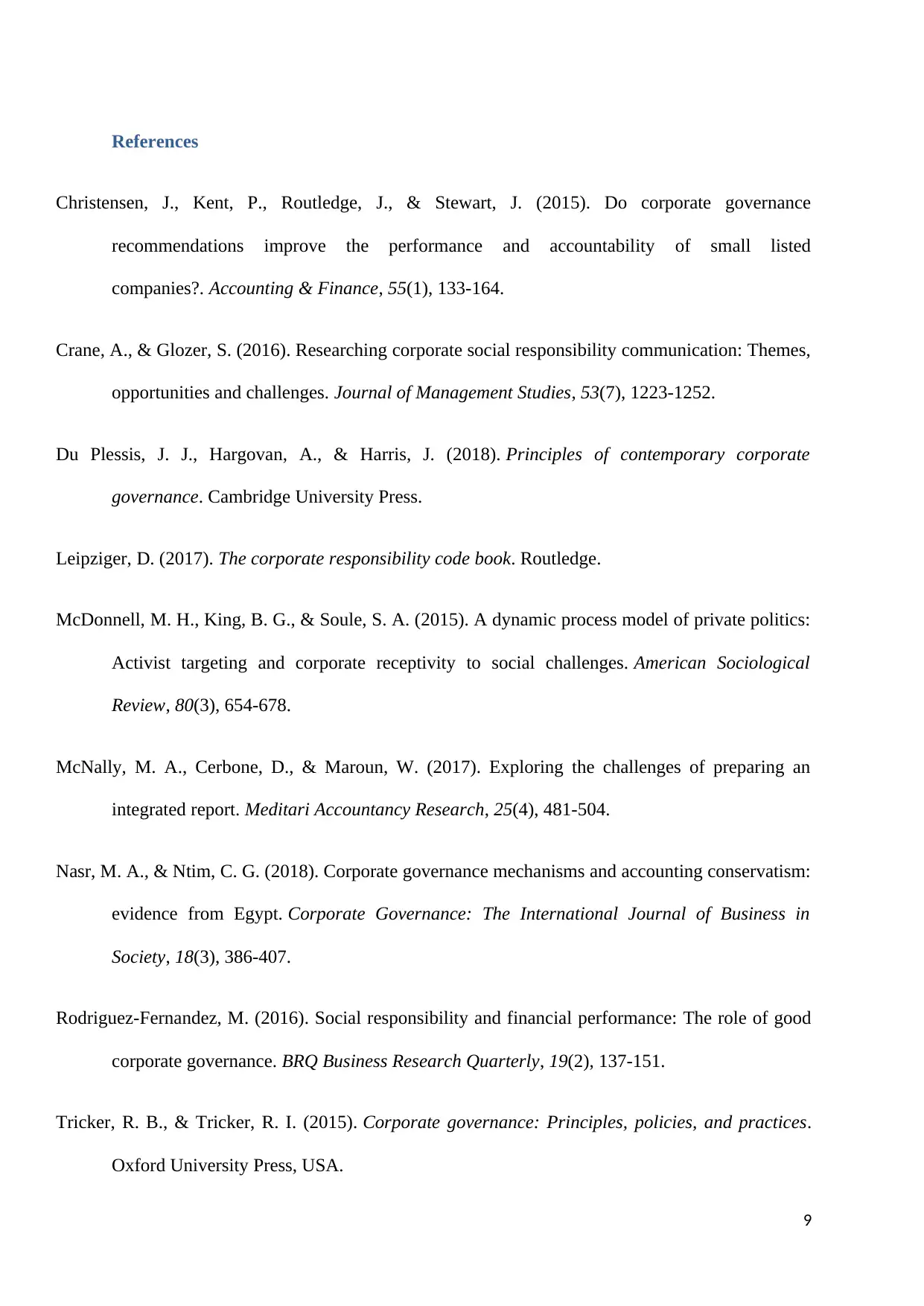
References
Christensen, J., Kent, P., Routledge, J., & Stewart, J. (2015). Do corporate governance
recommendations improve the performance and accountability of small listed
companies?. Accounting & Finance, 55(1), 133-164.
Crane, A., & Glozer, S. (2016). Researching corporate social responsibility communication: Themes,
opportunities and challenges. Journal of Management Studies, 53(7), 1223-1252.
Du Plessis, J. J., Hargovan, A., & Harris, J. (2018). Principles of contemporary corporate
governance. Cambridge University Press.
Leipziger, D. (2017). The corporate responsibility code book. Routledge.
McDonnell, M. H., King, B. G., & Soule, S. A. (2015). A dynamic process model of private politics:
Activist targeting and corporate receptivity to social challenges. American Sociological
Review, 80(3), 654-678.
McNally, M. A., Cerbone, D., & Maroun, W. (2017). Exploring the challenges of preparing an
integrated report. Meditari Accountancy Research, 25(4), 481-504.
Nasr, M. A., & Ntim, C. G. (2018). Corporate governance mechanisms and accounting conservatism:
evidence from Egypt. Corporate Governance: The International Journal of Business in
Society, 18(3), 386-407.
Rodriguez-Fernandez, M. (2016). Social responsibility and financial performance: The role of good
corporate governance. BRQ Business Research Quarterly, 19(2), 137-151.
Tricker, R. B., & Tricker, R. I. (2015). Corporate governance: Principles, policies, and practices.
Oxford University Press, USA.
9
Christensen, J., Kent, P., Routledge, J., & Stewart, J. (2015). Do corporate governance
recommendations improve the performance and accountability of small listed
companies?. Accounting & Finance, 55(1), 133-164.
Crane, A., & Glozer, S. (2016). Researching corporate social responsibility communication: Themes,
opportunities and challenges. Journal of Management Studies, 53(7), 1223-1252.
Du Plessis, J. J., Hargovan, A., & Harris, J. (2018). Principles of contemporary corporate
governance. Cambridge University Press.
Leipziger, D. (2017). The corporate responsibility code book. Routledge.
McDonnell, M. H., King, B. G., & Soule, S. A. (2015). A dynamic process model of private politics:
Activist targeting and corporate receptivity to social challenges. American Sociological
Review, 80(3), 654-678.
McNally, M. A., Cerbone, D., & Maroun, W. (2017). Exploring the challenges of preparing an
integrated report. Meditari Accountancy Research, 25(4), 481-504.
Nasr, M. A., & Ntim, C. G. (2018). Corporate governance mechanisms and accounting conservatism:
evidence from Egypt. Corporate Governance: The International Journal of Business in
Society, 18(3), 386-407.
Rodriguez-Fernandez, M. (2016). Social responsibility and financial performance: The role of good
corporate governance. BRQ Business Research Quarterly, 19(2), 137-151.
Tricker, R. B., & Tricker, R. I. (2015). Corporate governance: Principles, policies, and practices.
Oxford University Press, USA.
9
1 out of 10
Related Documents
Your All-in-One AI-Powered Toolkit for Academic Success.
+13062052269
info@desklib.com
Available 24*7 on WhatsApp / Email
![[object Object]](/_next/static/media/star-bottom.7253800d.svg)
Unlock your academic potential
Copyright © 2020–2026 A2Z Services. All Rights Reserved. Developed and managed by ZUCOL.





